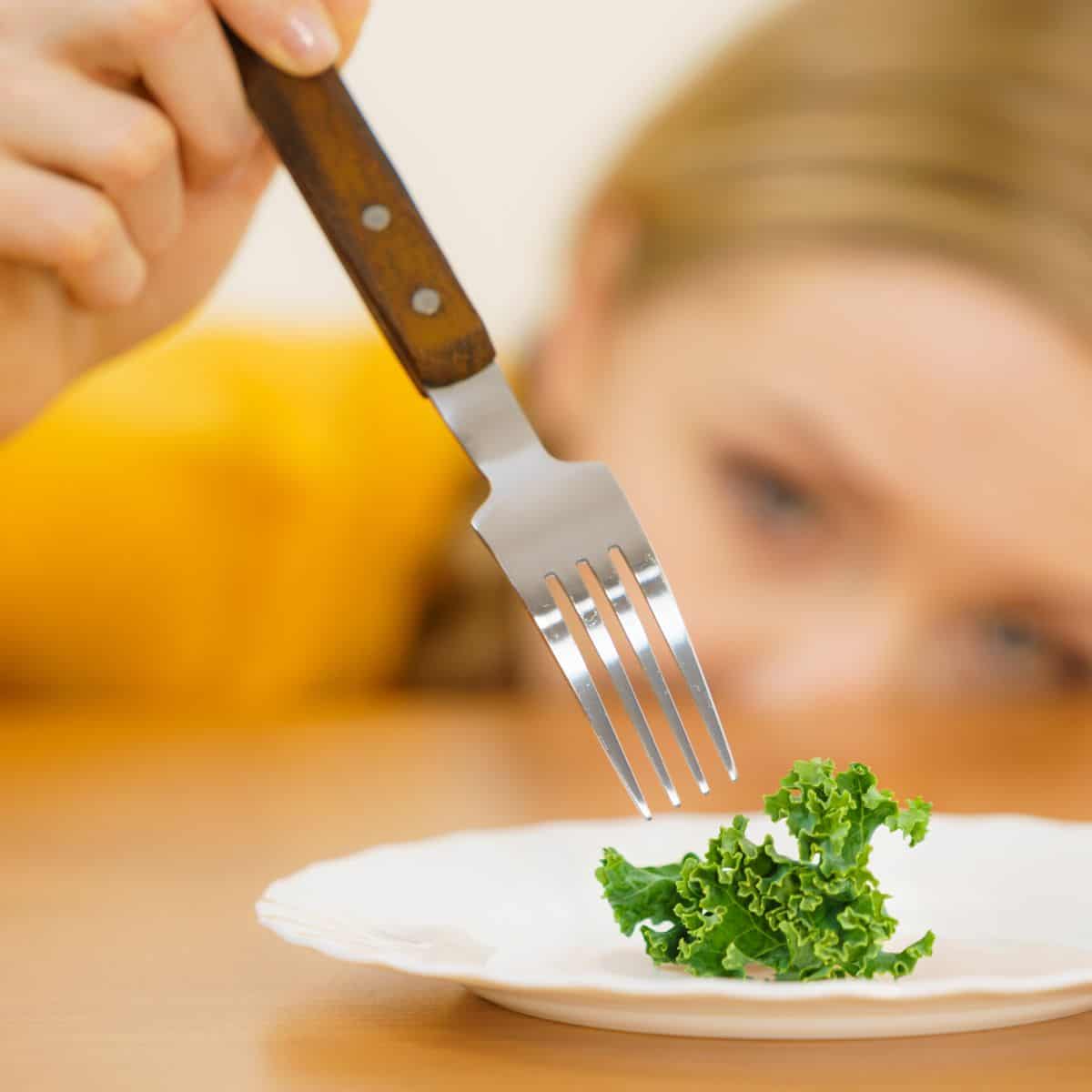Here’s What Causes Picky Eating. And What Reverses It.
Apr 19, 2023, Updated Feb 25, 2025
This post contains affiliate links. Please see our disclosure policy.
I’m going to explain some of the potential causes of your child’s picky eating. But first…want to know what doesn’t cause picky eating?

Parents.
Yep, you heard me! Parents are not to blame for our kids’ picky eating. And you are not to blame for your child’s picky eating.
This topic is very personal to me because my oldest, Teddy, has been a picky eater ever since he became a toddler. I’m in a much better place now, but for a long time, I blamed myself. I wondered where I went wrong. And lots of time and tears went to seeing myself as the problem—when I should have been focusing on being part of the solution for him!
So repeat after me: “I am not the reason my child is picky! But I CAN help them move forward.” And keep that in mind as we go through the intrinsic causes of picky eating. AKA the ones your child was born with. And the ones not related to you at all!
Table of Contents
- Parents Don’t Cause Picky Eating
- Wired for Pickiness: The Intrinsic Causes of Picky Eating
- Intrinsic Cause #1: Taste Perception
- Intrinsic Cause #2: Food Neophobia
- Intrinsic Cause #3: Emotional Temperament
- Intrinsic Cause #4: Sensory Needs
- ADD, ADHD, Autism & Picky Eating
- Extrinsic Causes of Picky Eating & How To Reverse Them
- Picky Eater Parent, You Are Not To Blame!
- Reverse Picky Eating with Simple Steps to Picky Wins
Parents Don’t Cause Picky Eating
No, I’m not done talking about this yet. 🤪
It’s very easy to feel like you’re the problem and blame yourself when your child is picky. Even knowing what I know about pediatric nutrition and picky eating, I’d ask myself where I went wrong or what I did to make this happen. I think in some ways, it’s easier to believe that you did cause it, right? Because if you caused it, you can fix it. But what I had to acknowledge—and what you might have to acknowledge, too—is that picky eating is not totally in a parent’s control.
If this is hard to HEAR, I bet it’s because you so badly want to fix things your kids’ struggles for them—which, of course you do! We all want to take our kids’ struggles away.
If it’s hard to fully ACCEPT, I bet it’s because there are people in your life straight-up telling you that you’re feeding your child wrong. (They don’t know what they’re talking about—but I do! So stick with me.)
Related: Take the Picky Eater Quiz
Wired for Pickiness: The Intrinsic Causes of Picky Eating
Picky eating can be influenced by external factors, but to a large degree, it’s an intrinsic thing. It can even be genetic! So if your child is picky now, there’s a chance they always would have been—regardless of what you did. People miss this part of picky eating when they say things like:
- “You just have to expose them to that food more!”
- “Just give them what you’re eating!”
- “They’ll eat it eventually! They won’t starve themselves.”
Learning these intrinsic causes of picky eating will help you understand better why your child is eating the way that they are. And, it’ll give you some ammunition when your lovely in-laws or well-meaning friends have comments about your picky eater!

Intrinsic Cause #1: Taste Perception
In general, children prefer higher levels of sweetness and salt than adults do. This is due to their biology, so it’s not something you can prevent. They’re also more sensitive to bitter tastes, which is why most kids hate Brussels sprouts with a passion…but can get into corn and sweet potatoes.
These differences in taste perception tend to decrease as kids age and we don’t actually know why—but the phenomenon has been observed in other mammals, too. This is pretty interesting because it shows that, as complex as we are as humans, we’re also just animals at the mercy of our biology! And the same is true for your picky toddler.
Taste perception is something all kids experience, so it’s not necessarily going to make your child picky. But it’s definitely a thing! And it does give you good context for why vegetables are so dang hard.
Related: Download my free Sweets & Treats eBook
Intrinsic Cause #2: Food Neophobia
The second intrinsic factor that can play into picky eating is food neophobia: the reluctance to eat new foods or the avoidance of new foods.
When you get into the research, you’ll see that researchers try to differentiate between “true” food neo-phobia and picky eating. But the way I see it, the two are interrelated—because the research on food neophobia often aligns perfectly with picky eating. For example, one study found that food neophobia tends to increase from ages 1 to 6, then decrease through early adulthood, and remain stable as an adult. Well, the same is true for picky eating—the biggest struggles tend to happen between ages 1 and 6!
Any child can experience food neophobia and of course, the intensity of the phobia can vary greatly. But food neophobia is a real thing that we picky eater parents have to be aware of and respect. Because even when being afraid of a speck of broccoli in their rice makes zero sense to us, for them, it’s very real. And we need to remind ourselves of that and be patient.

Intrinsic Cause #3: Emotional Temperament
Emotional temperament refers to the biologically-based personality characteristics that have been evident in your child from birth and remain consistent across most situations. There’s growing evidence to show that your child’s emotional temperament plays a significant role in their eating habits! More specifically, if they’re predisposed to becoming upset easily or feeling distressed consistently, they’re more like to experience food fussiness or pickiness.
This backs up what I’ve seen first-hand working with families, too. Kids who are more reactive to food—and might even appear to be overreacting—are usually more resistant to change too, or don’t like breaking routine. It affects more than just eating!
As parents, it’s easy to wonder whyyyyy these seemingly little things make them so upset. But these things are part of who they are and they can grow to be incredible parts of them. So take heart! But also, take some validation in the fact that when it comes to your feeding relationship with them, it presents a real challenge.

Intrinsic Cause #4: Sensory Needs
There’s a wide range of potential sensory struggles for kids around food. Your picky eater could be hyper- or hypo-sensitive to different textures, smells, temperatures, or even colors! And any sensory struggle a child has can greatly impact their decision to eat—or not eat—a food. So it’s a valid reason for food pickiness to occur.
If your child is hyper- or hypo-sensitive, chances are, as a parent, you’ll notice it popping up in other areas of their life as well. They might not like touching different things or having their hands be wet or messy. They might not like touching sand. Maybe they flip out about mud. Or maybe they notice and experience smells much stronger than you do. If you reflect and realize that your child is “picky” or “fussy” in places other than the kitchen table—sensory needs could be at play.
In my picky eater course, Simple Steps To Picky Wins, I help you evaluate the different sensory inputs food presents and how your child might react to them. Then, I teach you to use what you know about their sensory needs and preferences to identify foods that will be easier for you to introduce (and for them to accept).

ADD, ADHD, Autism & Picky Eating
Your child could have a diagnosis attached to their sensory struggles with food. But it’s not a necessary prerequisite. Food is an extremely sensory experience so it can be overwhelming for any child.
That said, feeding difficulties like selective eating and picky eating can be symptoms of conditions like sensory processing disorder, ADD or ADHD, autism, or Avoidant-Restrictive Food Intake Disorder (ARFID)—which is rare but does affect kids. Any of these conditions can co-occur with picky eating. So never brush off any of your intuition or your instincts. If you think your child may need an evaluation or more support in a given area, advocate for that! And if you’re told to “wait and see” or your pediatrician gives you the “most kids are picky at this age” brush-off, ask for a second opinion. Especially if you notice that they struggle with sensory input in other areas of life, too.
Extrinsic Causes of Picky Eating & How To Reverse Them
I mentioned above that there are also extrinsic factors that contribute to picky eating. Some of them are harder to control, but many are simple tweaks you can make—things you or your family members could be doing that you don’t even realize are affecting picky eating, but might be. I don’t want you to think of these as causes of picky eating so much as behaviors and routines you can address as you work to reverse your child’s picky eating.
Here’s what I mean: Maybe your child is picky and you think it’s because you’re the worst influence with food. You eat cocoa puffs for breakfast every single morning, you eat the same ham sandwich for lunch every single day, and you eat mac and cheese for dinner every single night. But that alone is not going to stop your child from wanting to try new things! Might they be more interested in trying new foods if you made more of a variety? Sure. But it’s not going to be the only reason why they’re picky. So while you did NOT cause their pickiness, as their parent, you ARE in a great position to be part of the solution to help them eat more foods and feel more comfortable around different foods. These are the exact types of situations I guide parents through in my picky eating course, Simple Steps to Picky Wins.

Picky Eater Parent, You Are Not To Blame!
I hope this post makes you feel a little better. Because their picky eating is NOT all on you. That’s a fact!
Picky eating is part of who your child is at this age. It’s one of their struggles. And trust me, all kids and families have struggles. Whenever I open up about the challenges our family is navigating, I’m shocked and heartened to hear from so many other parents who are going through tough things, too. Whether it’s educational, behavioral, or health-related, there’s always stuff going on. You are not the only one!
If someone in your life is making you feel at fault, tell them to shut the f…ront door. 😉 And if it’s YOU being hard on yourself, remember you’re doing a fantastic job. It’s just that when it comes to food, so many things can work against you.
Reverse Picky Eating with Simple Steps to Picky Wins
Feeding doesn’t go away, right? No matter what happens, they’ve gotta eat. And when you’re the primary person doing the feeding, you deserve help and support.
If you’re struggling with picky eating, I highly recommend Simple Steps to Picky Wins—my online course that helps parents reverse picky eating, one win at a time. It’s self-paced, broken down into short videos, and whether you work on it every day or twice a week, you’ll have picky wins like these:
“It hasn’t even been 3 months and my son is eating all kinds of foods that he previously wouldn’t even touch!!! I wish I could have found this program/advice sooner because it has been so immensely helpful to us. It’s the help and direction I always wished I had when I felt helpless to get my son to eat better. Nothing had worked to improve his eating until this!”
-Angela M.
“Thanks to you, my four-year-old son has been eating a wider variety of foods, and exploring others. Progression levels and understanding different ways he can explore food has helped us achieve small and big victories! He noticed green beans in the fridge and ASKED for them for lunch! He wanted to have fun with them, not eat them, yet. That moment was a revelation.”














